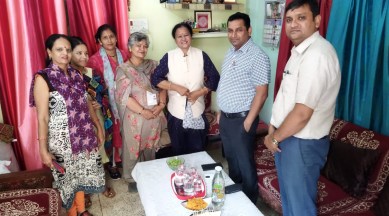Delhi Confidential: Union Minister Hardeep Puri keeps his promise, delivers jacket made of recycled plastic to sanitation worker
Less than a month after Union Housing and Urban Affairs Minister Hardeep Puri promised a woman sanitation worker at an event in Delhi, a jacket made of recycled plastic was delivered to her home in Uttarakhand.

Less than a month after Union Housing and Urban Affairs Minister Hardeep Puri promised a woman sanitation worker at an event in Delhi, a jacket made of recycled plastic was delivered to her home in Uttarakhand. While interacting with women waste workers on March 29, Puri had told one of them, Prabha Khanka, that he would have a recycled jacket made to her measurements and delivered to her. On Thursday, the Swachh Bharat Mission-Urban Twitter handle shared photos of a smiling Prabha donning the white-coloured “waste to wealth” sleeveless jacket.
Spiritual Influence
Kerala Governor Arif Mohammad Khan says that contrary to popular perceptions, Jawaharlal Nehru was deeply influenced by religion and spirituality in a higher sense — both in his youth and in later years. It was mainly the ritualistic aspects of religion from which Nehru stayed away, according to Khan. Delivering a lecture organised by Pradhanmantri Sangrahalaya on Thursday, Khan said much of the misunderstanding arises from Nehru’s self-confessed agnosticism and his emphasis on offloading baggage of tradition in order to modernise. The lecture focussed on the religious and spiritual overtones in Nehru.
monthly limit of free stories.
with an Express account.
Taking On Trolls
His comments during the hearing on petitions seeking legal status for same-sex marriage — that there is nothing absolute as man or woman — fetched Chief Justice of India D Y Chandrachud a flood of trolling on social media. The CJI seemed to have taken it sportingly and repeated his comment on Thursday, this time in the context of same-sex couples seeking adoption rights vis-a-vis children of heterosexual couples being exposed to domestic violence. “There are no absolutes, as I said,” he said, before pausing for a second and adding with a smile, “even at the risk of getting trolled”. The CJI added, “But now this has become the name of the game for judges to confront. Answers to what we say in the court are in the troll, not in the court.”